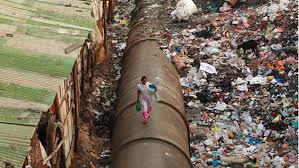Sanitation issues vividly impact life in Africa; over 2.5 billion people in developing countries of Africa don’t have access to basic sanitation. Sanitation refers to conditions relating to public health, especially the provision of clean water and adequate treatment and disposal of human excreta and wastewater. Sanitation advocates for proper hygiene among different societies. Proper hygiene calls for activities like access to clean water, pit latrines, solid waste handling and plague control.
Why Sensitization is the Way Forward
Sanitation seems a joke to many people as they seeminglessly act unconcerned, however the joke is catching up with many of them having symptoms of poor sanitation turning out to be more expensive to cure than prevention. Research indicates that over 315000 children in Africa die from diseases like diarrhea, cholera, dysentery and typhoid every year due to poor sanitation indicates like unclean water. The recent cholera outbreak is evident of poor sanitation in the world. Countries like Uganda have reported 43 suspected cases by January and in Kenya reports show a total of 843 cases where 34 are confirmed and 3 deaths reported by January 2019. This brief incite is not the end of it all however because more cases are arising in Africa and the world at large. Governments through various organizations have teamed up to help masses on how to deal with sanitation though their actions are still ineffective as portrayed by the increasingly in number cases of symptoms of poor sanitation.
Translation a Better Option for Sanitation Sensitization
Though various stakeholders have come up with helpful campaigns to help different communities promote sanitation, something is still missing in their endeavors. This is non-other than jointly working with profession translation service providers. It’s through translations of various languages that sensitization can be effective. Some of the language translations provided include;
Runyankole translation services
Karimojong translation services
Malagasy Translation Services
These, if well utilized can be a better option to promote sanitation sensitization. Translations carry information to various groups of people with a lot of easy of understanding, love and professionalism in languages that they understand best. Many people out there may be availed with all that it takes to promote hygiene and perhaps they are not properly informed on how to use that information in the best way possible. Thus a necessary evil to employ professional service providers to carry on their duty. Hence translation a better option to carry on sensitization for sanitation.
A number of people are not aware of how to avoid diseases carried through poor hygienes all because of lack of knowledge and language barriers in which such information is being passed on. Many brocures creating awareness on health and sanitaion are not translated hence becoming a hindering point to such people.
My argument on this would be to faccilitate professional translation services in the sanitation sensitization programs in order to reach a number of people regardless of the languages they do speak to render the sensitization fully effective in the long run.


